LONDON/ATLANTA: Saudi Arabia led the Arab world’s condemnation on Sunday of the assassination attempt on the life of former US president and current presidential candidate Donald Trump, stressing its rejection of violence, sending condolences to the deceased, and wishing a speedy recovery for those injured.
The Kingdom affirmed its “complete solidarity with the US, the former US president and his family.”
The day before, the world was left in shock when Trump was shot during a campaign rally in Butler County, Pennsylvania.
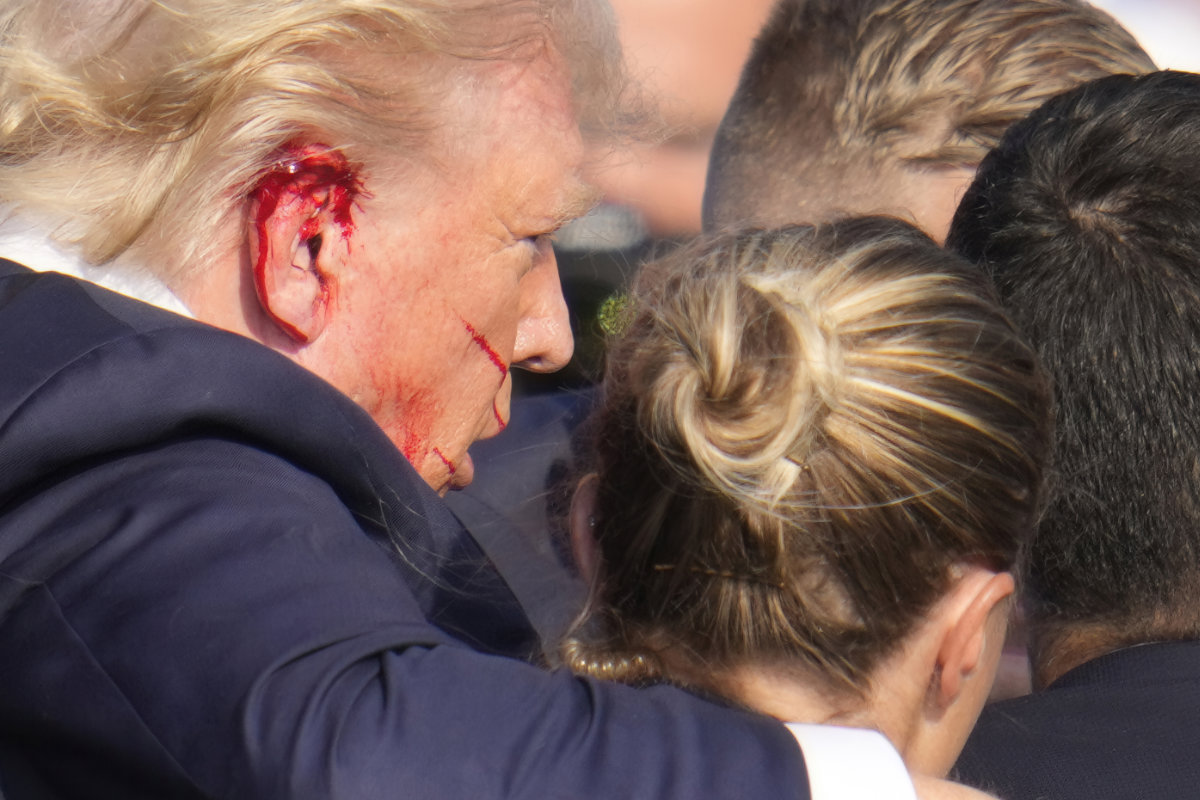
Donald Trump is escorted by Secret Service agents away from the stage as his right ear bleeds after being hit by an assassin's bullet on Saturday in Butler, Pennsylvania. (AP)
The bullets wounded Trump in his right ear, killing a spectator and critically injuring two others. The former president was escorted off stage by a group of secret service agents while pumping his fist and shouting, “Fight! Fight!”
The shooter, who had positioned himself on a nearby rooftop, was reportedly killed by police snipers. But in that brief moment when he nearly assassinated the Republican Party’s presumptive presidential nominee, Crooks succeeded in damaging the political future of Biden, placed the Democratic Party in a difficult dilemma, and possibly sowed the seeds of further political polarization.
World leaders immediately condemned the shooting. The leaders of dozens of countries and the UN denounced the assassination attempt and political violence overall.

Leaders from across the Arab world joined in these condemnations. The UAE Ministry of Foreign Affairs condemned the “extremist and criminal act,” and Bahrain’s Ministry of Foreign Affairs labeled the attack as “a direct assault on democratic values.”
Egyptian President Abdel Fattah El-Sisi denounced the attack and hoped that the election campaigns would continue in a peaceful manner. Qatar’s foreign ministry also condemned the attack, stressing “the need to pursue dialogue and peaceful means and avoid political violence and hatred to overcome differences at all levels.”
Palestinian President Mahmoud Abbas also condemned the shooting in a message from Ramallah.

Arab Americans from the left and right of the political spectrum spoke out against the failed assassination attempt.
“There is a lot we don’t know. But what we do know is that violent rhetoric can give rise to violent behavior. We need to take action and that violence is never the way to resolve political differences,” Jim Zogby, president of the Arab American Institute in Washington, told Arab News earlier on Sunday.
Current US president Joe Biden, who is also Trump’s opponent in the upcoming elections, posted on the social media platform X: “There’s no place for this kind of violence in America. We must unite as one nation to condemn it.”
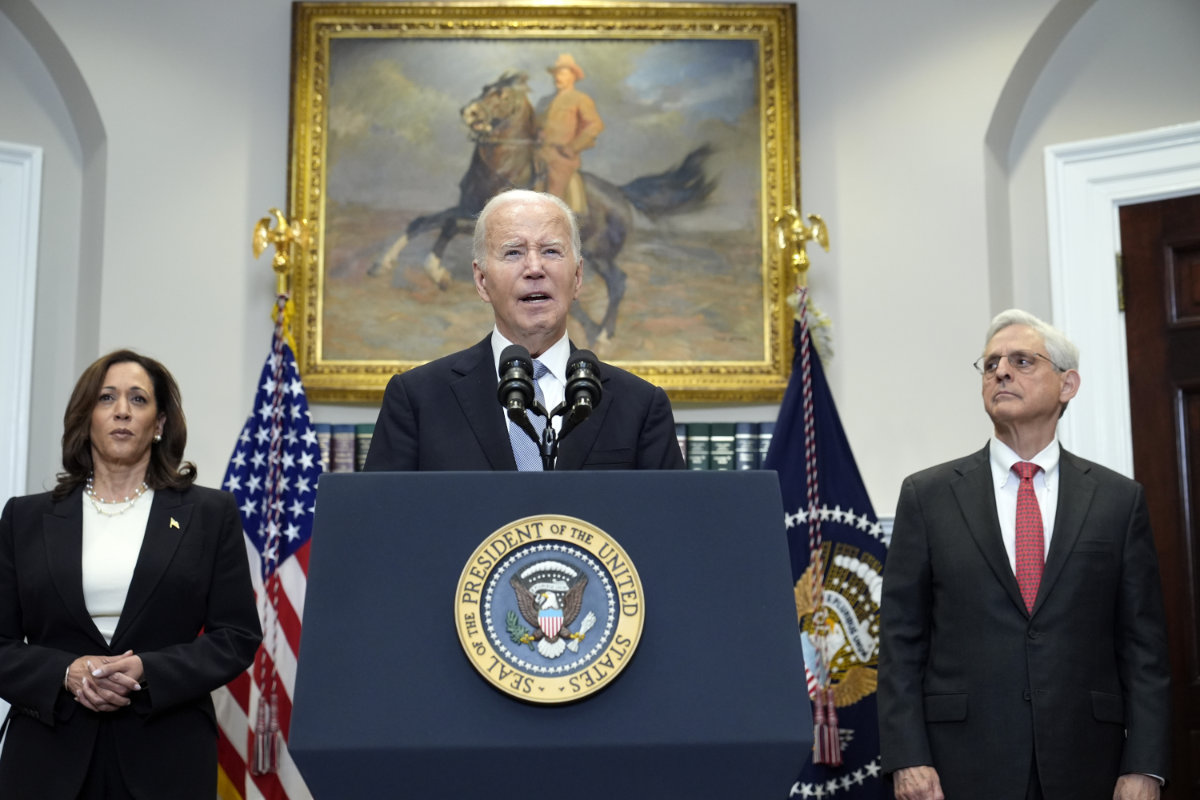
President Joe Biden speaks at the White House in Washington on July 14, 2024, to denounce the assassination attempt on his rival Donald Trump at a campaign rally in Pennsylvania. (AP)
Multiple replies to Biden’s post accused him of stirring anti-Trump rhetoric, with many going so far as to blame him for the shooting.
Some are questioning how the shooter, whom the FBI have identified as 20-year-old Thomas Matthew Crooks of Pennsylvania, managed to carry out his attempt on Trump’s life in the presence of secret service agents and police snipers.
“There are serious questions that have to be answered on how the gunman was allowed an unobstructed line of shot, from a nearby rooftop, under 200 meters from the stage on which the former president was standing,” Oubai Shahbandar, a defense analyst and former Pentagon Middle East adviser, told Arab News from Washington, D.C.
Little is known about the shooter. State voter records show him as a registered Republican, though he had previously donated to a liberal political action committee as a teenager. Nothing is known about Crooks’ motives, and so far, law enforcement and Crooks’ own family have been silent on the subject.

Police snipers return fire after shots were fired while Donald Trump was speaking at a campaign event in Butler, Penssylvania, on July 13, 2024. (AP)
Regardless of the motivations behind the shooting, many political analysts now believe that the assassination attempt will likely bolster Trump’s chances of winning the upcoming election.
“The image of President Trump, wiping the blood streaking across his face away, while defiantly raising his fist in the air and yelling ‘fight! fight!’ and the crowd roaring back ‘USA!’, is nothing short of historic. This will no doubt resonate with voters who contrast it with Biden’s apparent lethargy,” Shahbandar said.
Biden’s chances were already dampened by the June 27 presidential debate, where he was perceived widely to have performed very poorly. Biden appeared to ramble and struggle to speak at certain points, failing to match Trump’s energy and focus. A New York Times/Siena College poll found that after the debate, Trump led Biden 49 to 41 percent among registered voters.

Republican presidential candidate Donald Trump arrives for the campaign rally on Saturday in Butler, Pennsylvania. As he was speaking, an assassin started firing and hit Trump on the ear. (AP)
“The assassination attempt targeting President Trump in fact struck the political future and the candidacy of President Biden and his campaign. The Democrats will be in a very difficult position moving forward. President Trump will garner a lot of sympathy,” Firas Maksad, senior director for strategic outreach at the Middle East Institute, told Arab News from Washington, D.C.
“It will be very difficult for the Democrats to continue to rely on attacking President Trump personally in their campaign. I also think that President Biden is mortally wounded. They will either have to replace him. If they are unsuccessful in doing so, they are heading to almost certain political defeat in the polls in November.”
According to Zach D. Huff, a Middle East expert and Republican political consultant who assisted President Trump’s 2020 re-election effort in Nevada, “Joe Biden’s loss is a given.”
“Regional powers now have time to try to factor in the impact of President Trump’s nearly guaranteed win,” he told Arab News from Dubai.
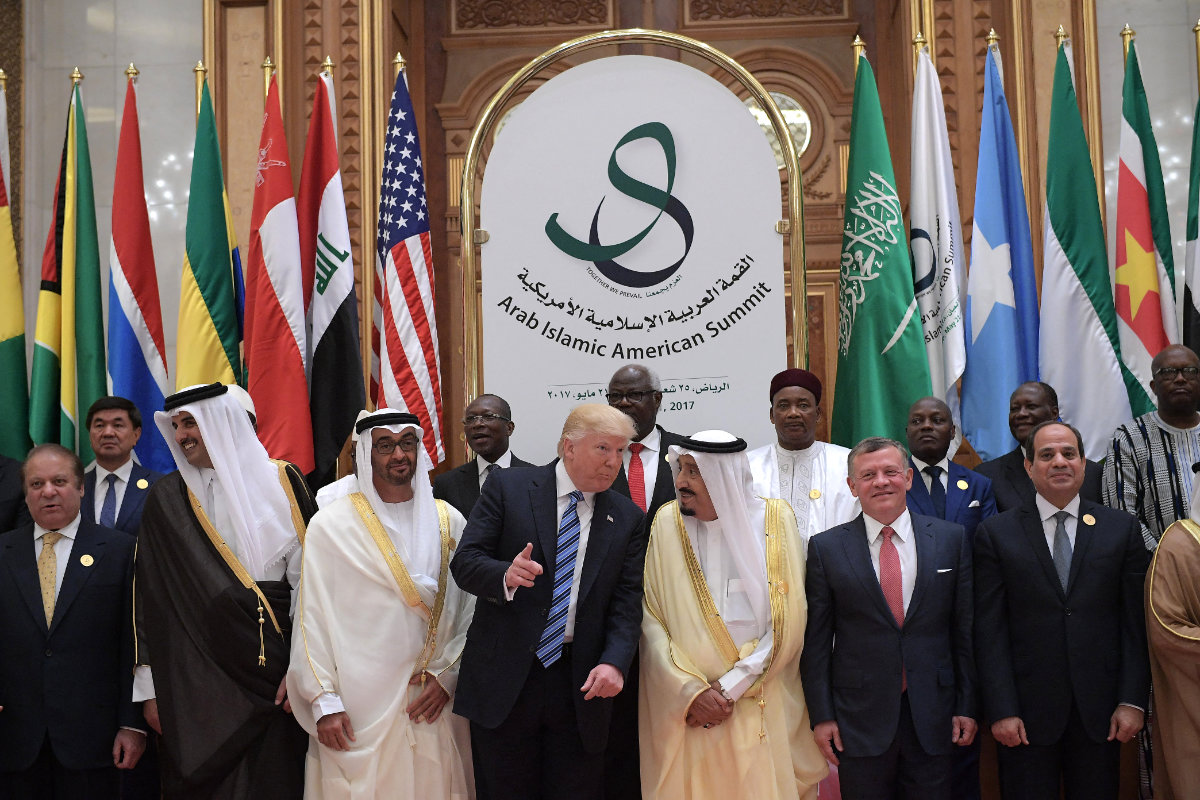
In this photo taken on May 21, 2017, US President Donald Trump (C-L), Saudi Arabia's King Salman bin Abdulaziz al-Saud (C-R), and other officials pose for a group photo during the Arab Islamic American Summit in Riyadh. (AFP/File)
The impact of the assassination attempt may have ramifications far beyond Pennsylvania, or even the US.
Shahbandar, the defense analyst, said that “by all objective measures, the likelihood of a Trump return to 1600 Pennsylvania Ave. is now incredibly high. And that will likely be met with wide support among senior leadership in the Middle East who are eager to engage a team they are well familiar with.”
Huff believes America’s rivals such as Iran and China will be “left guessing what Trump will do to repel their influence.”
“Hamas and Hezbollah could feel pressure to conclude their best possible deal while Biden is around, before Trump wins. They are unlikely to seek an escalation that could easily last into the next US administration,” he said.
As for Biden’s attempts to bring about a Saudi Arabia-Israel normalization, Huff said “the window has already closed, with no time left for the US Senate to ratify an agreement,” adding: “Saudi Arabia will probably find better terms under Trump and may feel less pressure to normalize ties with regional adversaries.”
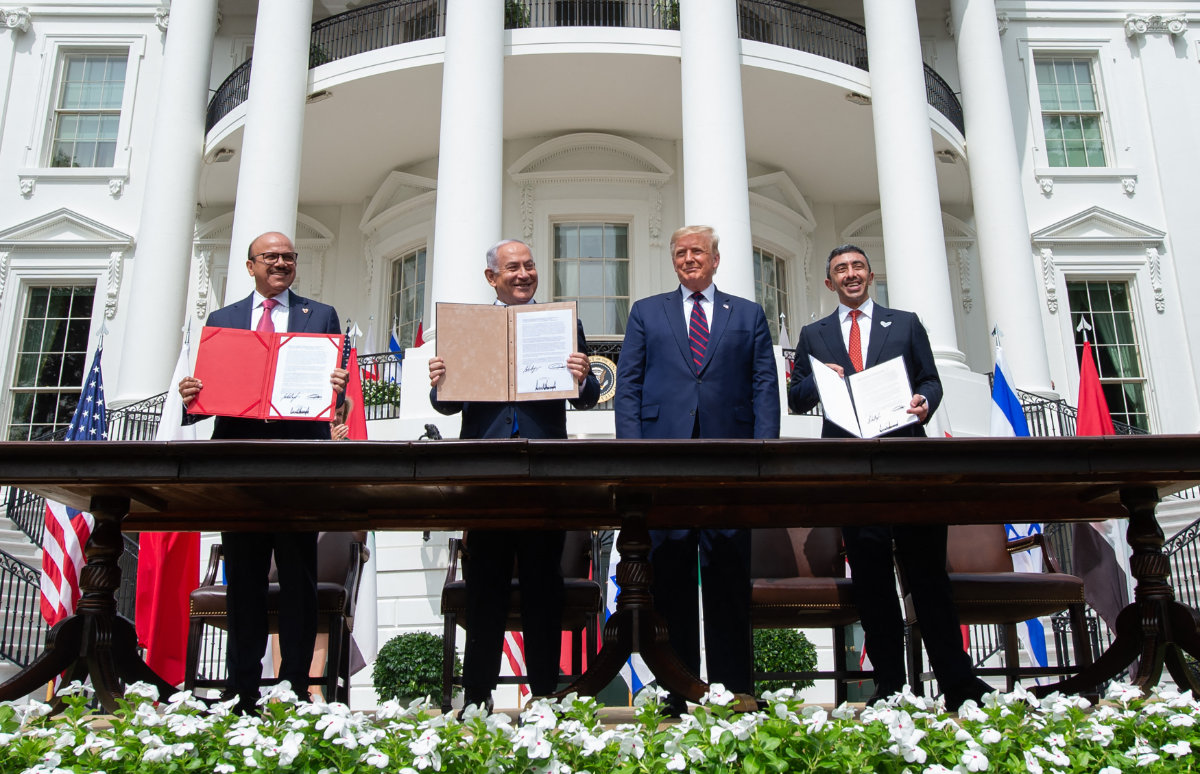
This photo taken on Sept. 15, 2020 shows US President Donald Trump with Bahrain FM Abdullatif al-Zayani (left), Israeli PM Benjamin Netanyahu, and UAE FM Abdullah bin Zayed Al-Nahyan during the signing of the Abraham Accords. (AFP)
The history of Trump’s approach to US relations Middle East countries is a checkered one, sometimes focusing on diplomacy and deals and, at other times, focusing on military force.
His first foreign trip in office in May 2017 was to Saudi Arabia, and he maintained warm relations with the Kingdom throughout his term.
In 2020, he facilitated the signing of the Abraham Accords, a series of bilateral agreements between Israel and the UAE and Israel and Bahrain. Morocco and Sudan followed suit the next year.
Trump faced criticism, however, for some of his Middle East policy decisions. In 2017 the then-president ordered a series of “precision” strikes on a Syrian airbase, drawing the ire of Russia and Iran. The decision was taken in retaliation for a chemical attack by the Syrian regime in which dozens of civilians were killed.
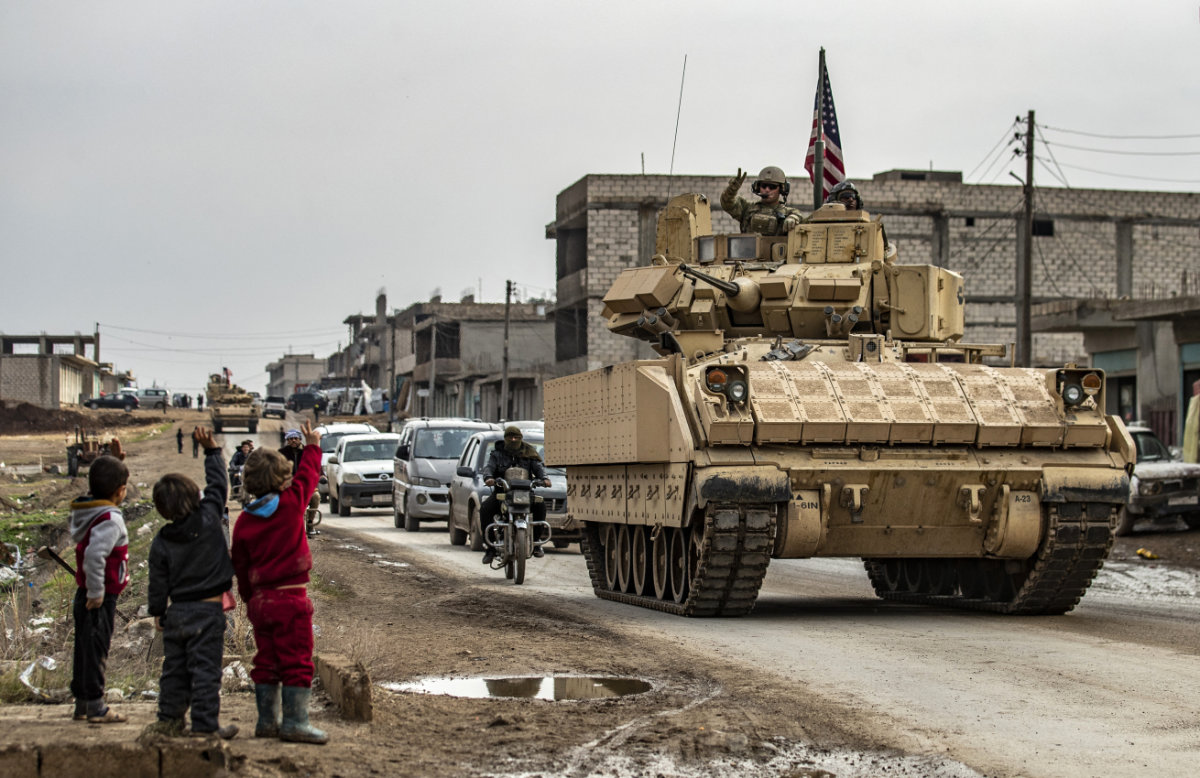
Children greet a US troop patrol in the Syrian town of al-Jawadiyah, in the northeastern Hasakeh province, near the border with Turkey, on Dec.17, 2020. (AFP)
Just two years later, in October 2019, Trump ordered the withdrawal of US troops from northern Syria, where they had been supporting the Kurdish-led Syrian Democratic Forces.
This decision was strongly condemned in a 354-60 vote in the US House of Representatives, as just days after the withdrawal, a Turkish incursion into the region led to the deaths of hundreds and displacement of 300,000 civilians.
Huff highlighted Trump’s 2024 policy platform, which calls for peace in the Middle East, support for Israel, and the rebuilding of “our alliance network in the region to ensure a future of peace, stability, and prosperity.”
“A key question is how far that alliance network will reach,” he said.
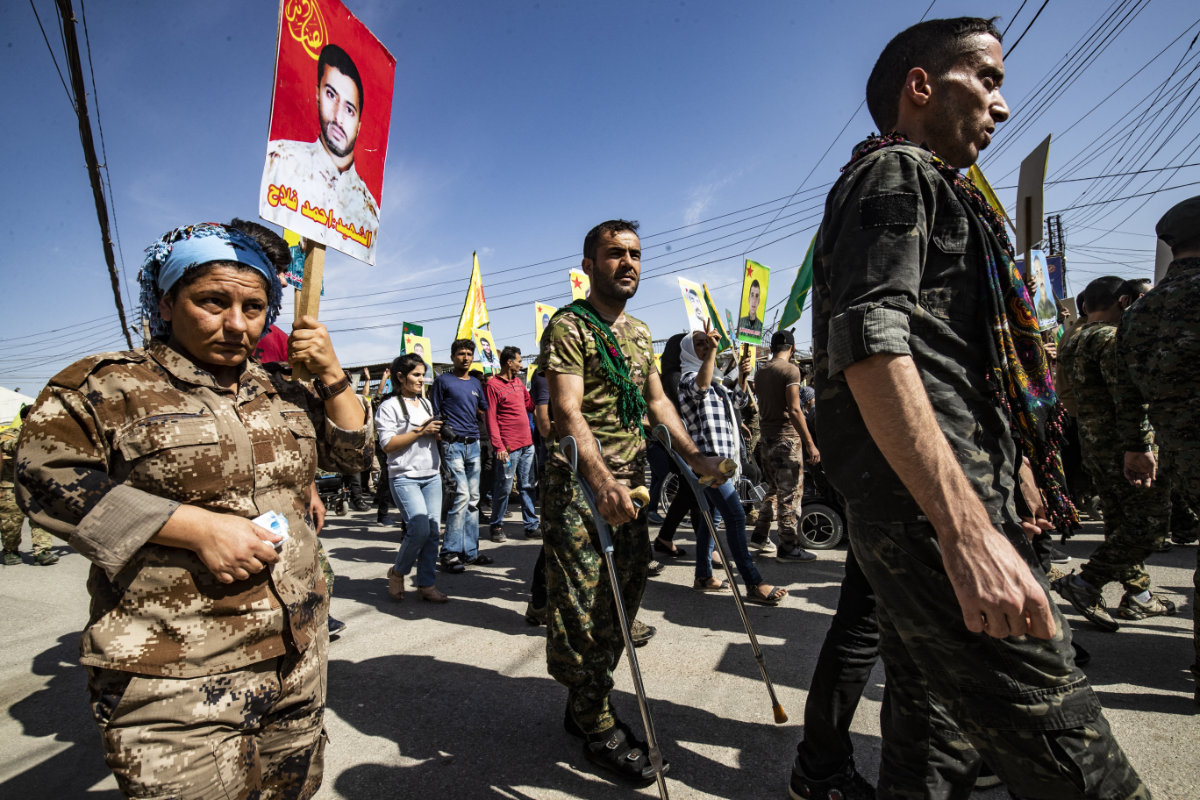
Kurdish fighters and veterans march on Oct. 8, 2019, in front of the UN office in the northern Kurdish Syrian city of Qamishli to protest against Turkish threats in the Kurdish region. (AFP)
“Will it include the Kurds, who hold the line against Iran, and who prevent a return of Daesh? Could it include Qatar and Turkey?”
Going forward, two US lawmakers intend to introduce bipartisan legislation providing President Biden, Trump and presidential candidate Robert Kennedy Jr. with enhanced Security Service protection.
The new law could give Donald Trump, Joe Biden and presidential candidate Robert Kennedy Jr enhanced Secret Service protection. “Anything less would be a disservice to our democracy,” Congressmen Ritchie Torres and Mike Lawler said on Sunday.




























